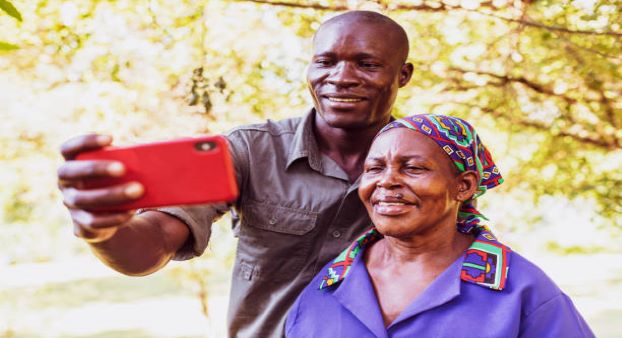Telecom
GSMA Urges Closing the Mobile ‘Usage Gap’ to Achieve Sustainable Development Goals

Closing the mobile internet ‘usage gap’ should be a priority for countries seeking to deliver against the ambitious UN Sustainable Development Goals, according to the GSMA’s seventh annual Mobile Industry Impact Report: Sustainable Development Goals.

The report shows that, six years after becoming the first industry to commit to the SDGs, the mobile sector continues to increase its contribution to the achievement of all 17 goals. However, despite mobile operators’ continued commitment to the 2030 agenda, there is still a long way to go.
A combination of global conflict, growing food and energy poverty, economic uncertainty, and the ongoing impacts of Covid-19 are creating significant headwinds, currently threatening SDG progress worldwide. In the face of these challenges, the report highlights the crucial role mobile connectivity and connected technologies can play as enablers, supporting countries as they ‘build forward better’ in pursuit of economic recovery and resilience.
In many countries, particularly low- to middle-income nations, mobile is the principal way to access the internet. Mobile operators’ investments in network infrastructure have helped to shrink the ‘coverage gap’ for mobile broadband networks from 1.4 billion people in 2015 to 400 million people in 2022, contributing strongly to a range of SDG indicators.
However, around 3.2 billion people who are covered by networks are still unable to reap the benefits of this connectivity, due to lack of skills, knowledge, affordability, relevant content and other factors. This ‘usage gap’ is fast emerging as one of the biggest ‘brakes’ on economic and social progress globally.
The report demonstrates how people with access to fast, reliable networks are able to stay connected to friends and family, work remotely, access education and health services, build innovative businesses, improve efficiencies and reduce carbon emissions.
“Those without access, in contrast, are most vulnerable to economic and social disruption, and risk falling further behind as the world emerges from the pandemic, especially as online services become even more integral to society.
Jose-Maria Alvarez Pallete, CEO of Telefonica and GSMA Chairman said: “In a world where conflict, food insecurity and economic uncertainty are at the top of the global agenda, mobile has never had a more important role to play.
“The GSMA’s SDG Impact Report demonstrates the transformational impact of communications in tackling these enormous challenges, acting as a catalyst for positive change and delivering meaningful progress.”
Mats Granryd, GSMA Director General, said: “The UN General Assembly in New York this week is a powerful reminder of the importance of collective action in the face of growing global challenges. The SDGs remain a guiding compass for global progress, and the mobile industry is proud to be both an advocate for them, and a crucial enabler of their delivery.
“Mobile connectivity and digital inclusion are essential tools to achieve the ambitious goals laid out in the 2030 Agenda and help the world face into the headwinds of global inequality, poverty and conflict.
“We urge policymakers to address the barriers that constrain private sector investment in high-quality mobile networks and to join in helping close the ‘usage gap’ that holds back so many from living up to their potential in our increasingly connected world.
“Together, we can harness the power of connectivity as a catalyst for economic recovery, social progress, and digital inclusion, improving the lives of millions worldwide.”
The mobile industry’s SDG contributions
The mobile industry increased its impact on all 17 SDGs in 2021, with the average year-on-year increase accelerating compared with 2020. The average SDG impact score across the 17 SDGs reached 53, up from 49 in 2020 and 32 in 2015, meaning the mobile industry is achieving 53% of what it could potentially contribute to the SDGs. Other highlights include:
– There are now eleven SDGs where mobile’s contribution is over 50, compared to six in 2020 and none in 2015.
– The mobile industry continues to achieve its highest impact on SDG 9: Industry, Innovation and Infrastructure, driven by the reach of mobile networks and take-up of mobile internet services.
– The biggest improvements were recorded in the industry’s contribution to SDG 1: No Poverty, SDG 2: Zero Hunger and SDG 4: Quality Education. This is due to the increasing proportion of people using mobile for life-enhancing activities such as accessing government services, applying and searching for jobs and obtaining educational information for themselves or their children.
Telecom
Paradigm Initiative Champions Digital Rights and Inclusion at Africa IGF 2025 in Dar es Salaam

Paradigm Initiative (PIN) has reaffirmed its commitment to advancing digital rights and inclusion across Africa following its active participation in the 2025 Africa Internet Governance Forum (AfIGF), held in Dar es Salaam from May 29 to 31.

The forum convened diverse stakeholders from governments, civil society, the private sector, and academia to explore pressing internet governance issues under the theme “Building a Resilient Digital Ecosystem that Supports Africa’s Sustainable Growth and Global Leadership.”
PIN’s delegation contributed to conversations around digital security, digital rights and inclusion policy and compliance, emerging technologies, global governance, highlighting digital threats and making recommendations for an inclusive and rights-respecting digital landscape. Drawing from its research and advocacy efforts across the continent, the organisation offered practical policy recommendations aimed at fostering an open, secure, and human rights-respecting digital environment.
“The Africa IGF continues to serve as a critical space for shaping Africa’s digital future. We were pleased to contribute insights and amplify the urgent need for inclusive and rights-centric digital governance,” said ‘Gbenga Sesan, Paradigm Initiative’s Executive Director.
During the forum, PIN hosted and participated in multiple sessions, including: A panel on protecting civic space online, a workshop on bridging the digital divide through inclusive policies, and bilateral meetings with regional and global partners on shaping digital governance frameworks in the lead-up to key global internet governance conversations.
PIN’s presence at the AfIGF 2025 not only spotlighted emerging digital threats but also underscored its commitment to ensuring that all technological advancements and policies globally translate into greater digital freedoms and opportunities, not restrictions.
As part of its ongoing advocacy, the organisation will continue to engage with stakeholders across sectors to ensure that digital transformation in Africa is anchored in rights, equity, and inclusion.
Telecom
MTN Nigeria Unveils 21 Days of Y’elloCare to Empower Communities through Digital Tools

MTN Nigeria today held the opening ceremony for the 2025 edition of 21Days of Y’ello Care, the company’s annual employee volunteerism initiative.

This year’s campaign, themed “Connecting at the Roots – Connecting Communities through Digital Tools,” will run from June 1 to June 21, 2025, and focuses on supporting communities that continue to face barriers to digital access and connectivity.
MTN Nigeria kicked off on Sunday June 1 with trainings across different locations in Lagos where staff of the company volunteered to delivered training in valuable areas such as digital marketing and personal branding and employability skills.
In line with the Group-wide campaign theme, MTN Nigeria is implementing a series of grassroots initiatives aimed at expanding digital inclusion and connectivity in underserved areas.
Planned activities include equipping schools and community youth centres with devices, digital literacy workshops, deployment of community Wi-Fi access points, support for digital entrepreneurship and the establishment of an all-in-one Y’ello Pods across the country that will provide a digital hub for learning and support financial inclusion.
Speaking at the opening ceremony held in Lagos, Karl Toriola, Chief Executive Officer, MTN Nigeria said, Y’ello Care matters to us because we’re a digital company and we’re operating in an environment where there are so many needs. At MTN Nigeria, we care, and we want to show our direct connection and responsibility to the communities we operate in.
Now in its 18th year, Y’ello Care is a groupwide flagship MTN employee volunteering initiative that encourages MTNers to volunteer their time and expertise to support positive social change.
The campaign reflects MTN’s purpose to enable the benefits of a modern connected life for everyone and is anchored in the company’s core values.
In 2024, in a remarkable demonstration of corporate volunteerism, MTN staff, through the Y’ello Care initiative, reconstructed a school block at Iwerekun Community High School, Lakowe. This effort has restored hope and significantly improved learning conditions for both students and teachers.
For further information, updates on “21 Days of Y’ello Care”and MTN Nigeria’s commitment to social development, please visit yellocare.ng or follow us on social media.
Telecom
Google’s Open Buildings Data Empowers Africa’s Health and Climate Progress

Fresh, on-the-ground evidence from health planners and climate analysts in Rwanda, Nigeria and South Africa shows how the Open Buildings dataset, which maps more than 1.8 billion structures, is helping frontline projects close service gaps and strengthen community resilience.

Across the continent, artificial-intelligence tools are graduating from pilots to public-service workhorses, powering everything from crop-price forecasts to live language translation. Open Buildings—developed by researchers at Google Research Africa—is part of that shift, proving that open, locally guided AI can turn sparse data into timely decisions without locking African problem-solvers behind paywalls or proprietary gates.
In Rwanda, the Ministry of Health and Kigali-based Sand Technologies resited rural clinics with help from the dataset. Their new blueprint aims to bring 92% of citizens within a 30-minute reach of care, trimming journeys that put mothers and newborns at risk.
Across Northern Nigeria, epidemiologists at AFENET and geographers from WorldPop uncovered 10,250 buildings, guiding vaccinators who reached 70% of the zero-dose and under-immunized children identified through the mapping in just six months.
Meanwhile, the World Resources Institute (WRI) has already applied this flood-risk modelling in Dire Dawa, Kigali, Musanze, Gqeberha and Johannesburg, combining two-dimensional hydraulic simulations with building footprints to create block-by-block exposure maps.
The need is pressing: Nairobi is still recovering from the May 2024 floods that displaced more than 278 000 residents, while Johannesburg’s rapid growth along the flood-prone Jukskei River continues to heighten vulnerability
These projects tackle challenges felt across the continent. Africa still has about 8.7 million “zero-dose” children who receive no routine vaccines each year, while the urban population is projected to almost double to nearly one billion people by 2035— forcing new homes into high-risk floodplains and informal settlements.
By giving ministries, city engineers and NGOs a street-level view of where communities are growing and how they change over time, the Open Buildings dataset lets limited budgets flow to the people and places that need them most.
Dr Aisha Walcott-Bryant, Research Scientist & Head, Google Research Africa, “These projects show what happens when local expertise meets open, scalable technology: mothers reach clinics sooner, children receive long-overdue vaccines, and city planners get ahead of the next flood.
“We’re thrilled to stand beside partners who turn data into decisive action, proving that AI’s highest calling is to solve real-world challenges.”
From lifesaving clinics to climate-smart cities, these projects show how open AI is fast becoming Africa’s quiet engine for equitable progress.
The Open Buildings dataset—along with sample code, tutorials and its new 2.5D layer—is freely available at g.co/openbuildings.

 E-Business2 days ago
E-Business2 days agoFarmers to Get Identity Card for Loans, Inputs

 Telecom2 days ago
Telecom2 days agoARCON Probes 9mobile over Alleged N1Bn Advertising Debt

 News1 day ago
News1 day agoJAMB Waxes Worriedly over Rising Digital Exam Fraud

 News2 days ago
News2 days agoSERAP Sues NNPC over Alleged Missing ₦500Bn, Seeks Accountability

 E-Business1 day ago
E-Business1 day agoNIMC Plans to Register 95 Percent Nigerians by December

 Telecom1 day ago
Telecom1 day ago9mobile Nigeria Inks Agreement to Roam with MTN

 Telecom1 day ago
Telecom1 day agoBanks, Telcos to Start Deducting USSD Charges from Airtime Today

 E-Business2 days ago
E-Business2 days agoDyna.Ai Launches Operations in Nigeria


























